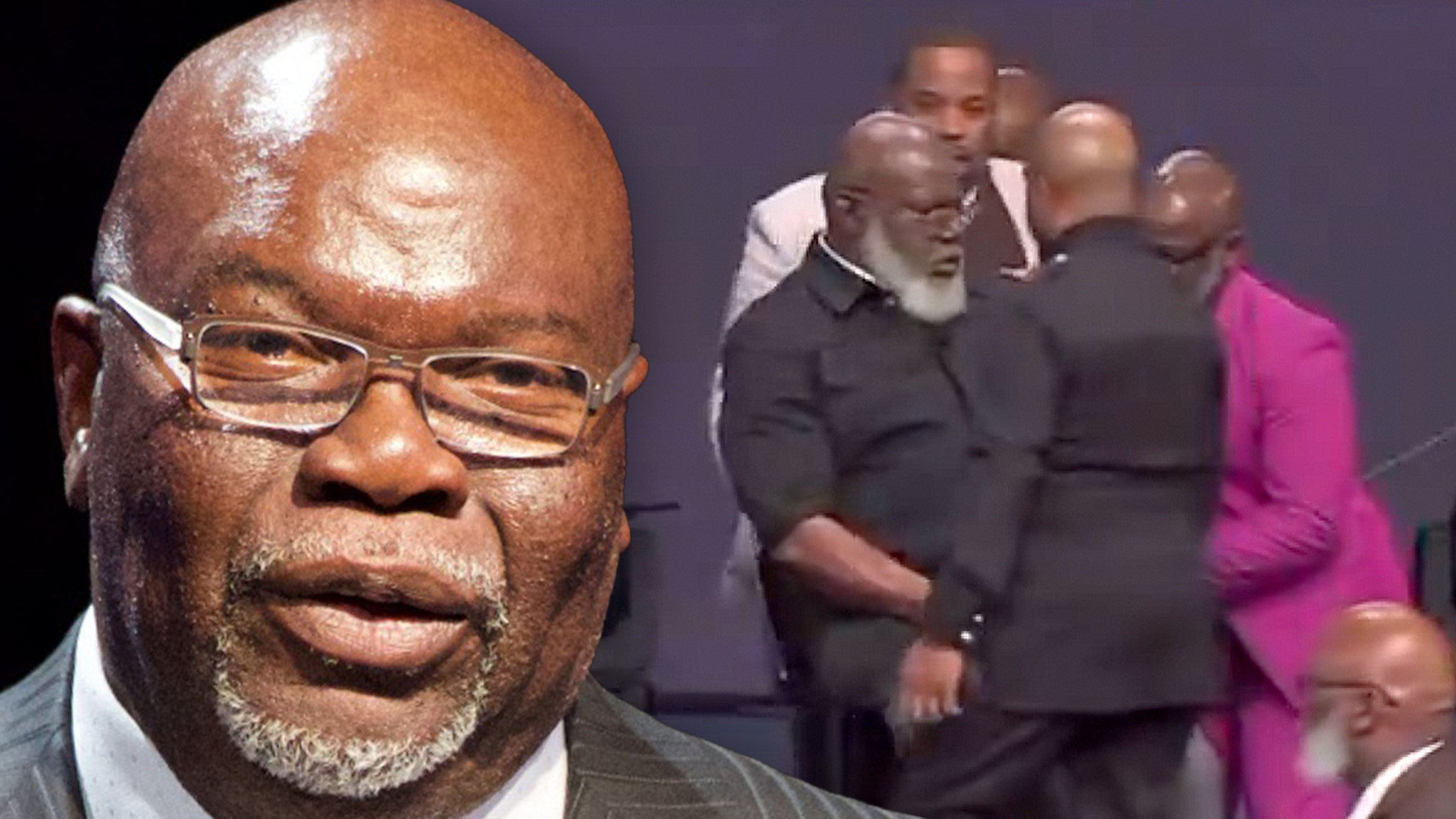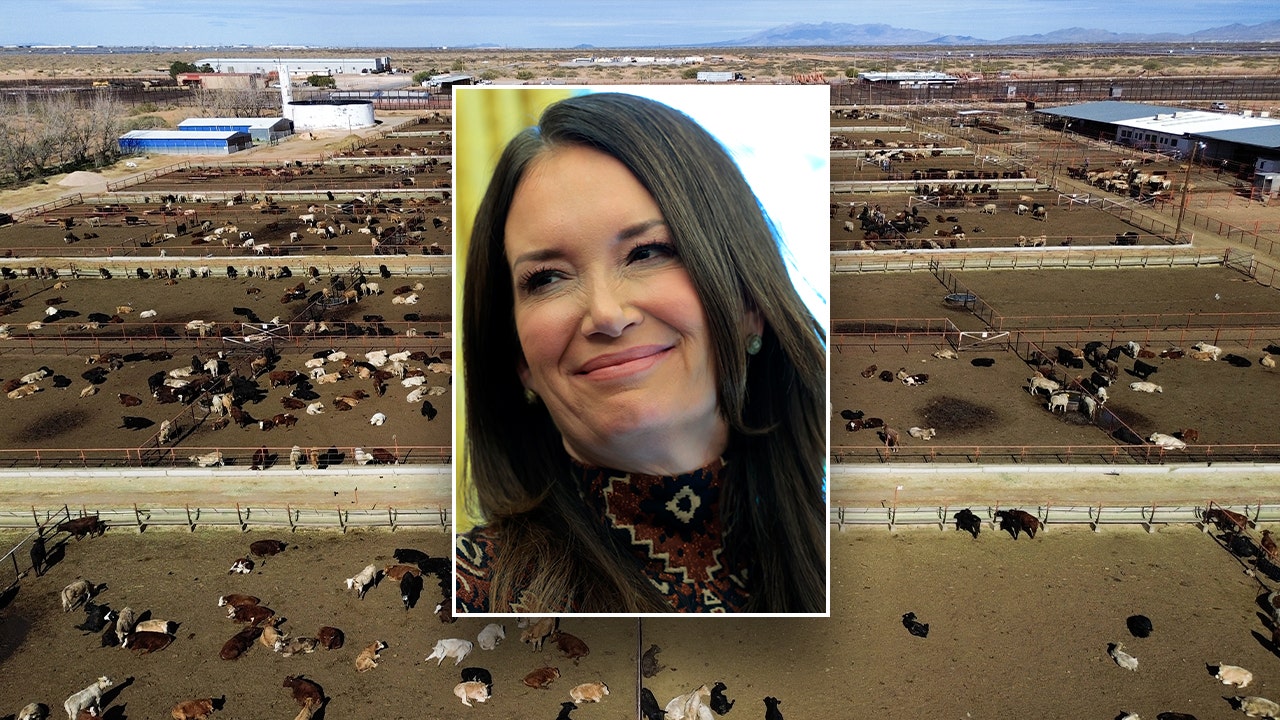New York
A Museum With a Timely Theme Reopens Today

Good morning. It’s Thursday. We’ll look at a museum whose reopening amid the migrant crisis seems particularly timely. We’ll also see why the man who controls the Knicks and the Rangers is not focused on New York right now.
The scaffolding had finally come off after a $7 million renovation, and Annie Polland was talking about the building.
It’s a conversation-starter, she said, and its reopening today comes amid new urgency for the conversations she imagines taking place there.
Polland is the president and chief executive of the Tenement Museum on the Lower East Side, which documents the long history of immigration in New York — one that seems all the more timely because of the influx of migrants in the last year and a half. Mayor Eric Adams has called it a humanitarian crisis, and it has strained the city’s shelter system, even as more than 200 new sites and relief centers have opened.
Any hope for a conversation between the mayor and President Biden, in New York for the United Nations General Assembly, was dashed on Tuesday at a reception the president hosted at the Metropolitan Museum of Art. Adams did not attend. “Everybody knows where I am,” he had said earlier in the day, suggesting that the president could find him if he wanted to.
Polland maintains that at a moment of intense polarization, the Tenement Museum can provide a more expansive look at American history.
“This is a dynamic place for people to exchange ideas and think about how learning about the past helps approach the issues we face today,” she told me. “History isn’t a grab-bag of solutions. You can’t just open it up and say, ‘Hey, we have a problem, what did they do with this in 1872’ or whatever.”
But looking back “gives us this opportunity to absorb more complexities” — and to understand the tensions. “In the 1850s people were saying Irish shouldn’t be here and the Germans drank too much,” she said. “Not all people, but some New Yorkers were nervous about a city that in 1855 had just become majority immigrant.”
What the Tenement Museum can do — “better than most places,” she said — is to show how ordinary people were engaged in the debates of their day. “If you find out that ordinary people in the past made changes and adapted and put forward new ideas,” she said, “you, too, have a foundation to put your own ideas and solutions out there.”
The museum has worked to broaden its core programming to spotlight more immigrant groups. The tenement apartments recreated at the museum now include not just one lived in by German and Irish families in the 19th century but also one that housed a Puerto Rican family in the 1960s and one that a Chinese family had lived in during the 1970s. In December, another apartment will join the group, a recreation of one where a Black waiter lived with his wife.
If the museum’s take on the past has not changed since it opened 35 years ago, its outlook for the future has brightened considerably. In mid-2020, when the pandemic wreaked havoc on cultural institutions — particularly smaller ones — they faced what Polland called an “existential crisis.” The Center for an Urban Future, a public policy research institute, cited the Tenement Museum as one of the hardest hit, in part because it drew more than 75 percent of its revenue from admissions and gift shop sales. The museum says the revenue component of its budget is now 60 percent, with 40 percent coming from donations.
The museum went ahead with the renovation despite the pandemic, though it had to close its landmark building at 97 Orchard Street to do so.
“The building wasn’t built in 1863 with the idea that it would be a museum 160 years later, even that it would exist 160 years later,” Polland said, and needed some modernizing. (Some exhibits were set up down the street in the museum’s other building, at 103 Orchard Street. Today is the first day in 13 months that the full museum will be open for tours.)
The renovation, designed by Li • Saltzman Architects, was deliberately “a multimillion-dollar effort” to make the building “look like it did,” she said, adding that the reopening would be “completely opposite from those HGTV shows where there’s a big reveal at the end.”
One change, noticeable to a regular like Polland, is that the newly reinforced stairs no longer creak underfoot. She sounded as if she had yet to adjust.
“I can’t lie,” she said. “I miss the creak.”
Weather
Enjoy a sunny sky with high temperatures around 74. At night, it will be partly cloudy with a low near 60.
ALTERNATE-SIDE PARKING
In effect until Monday (Yom Kippur).
Why James Dolan’s eye is on Las Vegas
James Dolan oversees a family empire that includes the Knicks and the Rangers, as well as Madison Square Garden and Radio City Music Hall. New York loves to hate him, but New York is not the focus of his attention right now. He is preoccupied with an arena that is about to open 2,500 miles away, in Las Vegas.
It cost $2.3 billion to build, with Dolan’s legendary stubbornness driving it to completion two years late and $1 billion over budget. It has more than 700,000 square feet of programmable video screens.
In New York, Dolan has been caught up in a controversy over a different technology — facial recognition software used to bar people from his venues, like lawyers who are suing companies he controls. Dolan said he did not understand why anyone would expect him to welcome “troll attorneys,” as he called them. “What do you mean I shouldn’t be upset?” he said in an interview.
Dolan’s “attorney exclusion list” drew widespread criticism after a lawyer from New Jersey arrived with her daughter’s Girl Scout troop for the “Christmas Spectacular” at Radio City Music Hall last year, only to be spotted by the software. Her law firm was representing a client in a slip-and-fall claim against a restaurant group that was at the time owned by a company under Dolan’s control.
Larry Hutcher, a Knicks fan, also learned that he was on the exclusion list. His law firm represented ticket resellers who were suing Madison Square Garden Entertainment. Hutcher then sued the Garden for barring him.
But after a judge dismissed the ticket resellers’ case, only one thing stood between Hutcher and his ability to watch his beloved Knicks in person: the lawsuit he had filed because he was barred.
Earlier this month, he dropped it. My colleague Katie Rosman writes that in essence, Dolan’s tactics succeeded.
METROPOLITAN diary
At the counter
Dear Diary:
I was sitting at the counter at my neighborhood diner, having a toasted (well-done) corn muffin and coffee, when a man in his 40s came in. He was dressed casually but nicely. He asked if he could take the seat next to mine.
“Sure,” I said.
He ordered an omelet with spinach and tomatoes.
“That looks good,” I said when it arrived. “And healthy.”
“Yeah, but your corn muffin looks good, too,” he said. “I love cornbread.”
I don’t know why, but I said, “Do you want a piece?”
“I’d love it,” he said.
So I gave him a piece of my muffin, which he gobbled up.
Can you imagine — taking food from a stranger’s plate in a diner? Somehow, we both knew it was OK.
— Aimee Lee Ball
Illustrated by Agnes Lee. Send submissions here and read more Metropolitan Diary here.
Glad we could get together here. See you tomorrow. — J.B.
P.S. Here’s today’s Mini Crossword and Spelling Bee. You can find all our puzzles here.
Kellina Moore and Ed Shanahan contributed to New York Today. You can reach the team at nytoday@nytimes.com.
Sign up here to get this newsletter in your inbox.

New York
Virginia Giuffre, Voice in Epstein Sex-Trafficking Scandal, Dies at 41

Virginia Giuffre, a victim of Jeffrey Epstein’s sex-trafficking ring who said she was “passed around like a platter of fruit” as a teenager to rich and powerful predators, including Prince Andrew of Britain, died on Friday at her farm in Western Australia. She was 41.
Ms. Giuffre (pronounced JIFF-ree) died by suicide, according to a statement by the family. She wrote in an Instagram post in March that she was days away from dying of renal failure after being injured in an automobile crash with a school bus that she said was traveling at nearly 70 miles per hour.
In the statement, her family called her “a fierce warrior in the fight against sexual abuse and sex trafficking” and “the light that lifted so many survivors.”
In 2019, Mr. Epstein was arrested and charged by federal prosecutors in the Southern District of New York with sex-trafficking and conspiracy, accused of soliciting teenage girls to perform massages that became increasingly sexual in nature.
Barely a month after he was apprehended, and a day after documents were released from Ms. Giuffre’s successful defamation suit against him, Mr. Epstein was found hanged in his cell in the Metropolitan Correctional Center in Lower Manhattan. His death, at 66, was ruled a suicide.
In 2009, Ms. Giuffre, identified then only as Jane Doe 102, sued Mr. Epstein, accusing him and Ghislaine Maxwell, his co-conspirator and the daughter of the disgraced British media magnate Robert Maxwell, of recruiting her to join his sex-trafficking ring when she was a minor under the guise of becoming a professional masseuse.
In 2015, she was the first of Mr. Epstein’s victims to give up her anonymity and go public, selling her story to the British tabloid The Mail on Sunday.
“Basically, I was training to be a prostitute for him and his friends who shared his interest in young girls,” Ms. Giuffre was quoted as saying in Nigel Cawthorne’s 2022 book, “Virginia Giuffre: The Extraordinary Life Story of the Masseuse Who Pursued and Ended the Sex Crimes of Millionaires Ghislaine Maxwell and Jeffrey Epstein.”
“Ghislaine told me that I have to do for Andrew what I do for Jeffrey,” she said.
Ms. Giuffre accused Mr. Epstein, a multimillionaire financier, and Ms. Maxwell, a British socialite, of forcing her to have sex with Prince Andrew, also known as the Duke of York. He flatly denied the accusations, but he relinquished his royal duties in 2019.
In 2021, she sued the prince, who is the younger brother of King Charles III of England, contending that he had sexually assaulted her at Ms. Maxwell’s home in London and at Mr. Epstein’s homes in Manhattan and Little St. James, in the Virgin Islands.
A widely published photograph showed Prince Andrew with his hand around her waist. He said he had no memory of the occasion.
After Prince Andrew agreed to settle the suit by Ms. Giuffre in 2022, he praised her in a statement for speaking out and pledged to “demonstrate his regret” for his association with Mr. Epstein “by supporting the fight against the evils of sex trafficking, and by supporting its victims.”
The settlement included an undisclosed sum to be paid to her and to her charity, now called Speak Out, Act, Reclaim.
In interviews and depositions, Ms. Giuffre said she was recruited to the sex ring in 2000 while working as a locker room attendant at Mar-a-Lago, President Trump’s resort in Palm Beach, Fla. By her account, she was reading a massage therapy manual when she was approached by Ms. Maxwell and invited to become Mr. Epstein’s traveling masseuse. She said the two of them then groomed her to perform sexual services for wealthy men.
Ms. Giuffre sued Ms. Maxwell for defamation in 2015 for calling her a liar; they settled for an undisclosed sum in 2017. Ms. Maxwell was convicted in 2021 of sex trafficking and other counts. The verdict was viewed as the legal reckoning that Mr. Epstein had denied the judicial system, and his victims, by hanging himself. Ms. Maxwell was sentenced to 20 years in prison.
Virginia Louise Roberts was born on Aug. 9, 1983, in Sacramento to Sky and Lynn Roberts. When she was 4, the family moved to Palm Beach County, where her father was a maintenance manager at Mar-a-Lago.
She said she ran away from home after having been molested by a close family friend since she was 7. She was placed in foster homes; boarded with an aunt in California; fled to the Haight-Ashbury neighborhood of San Francisco, the former hippie haven; lived on the streets when she was 14; and spent six months with a 65-year-old sex trafficker, who abused her.
Compared with living on the streets and earning $9 an hour for her summer job at Mar-a-Lago, Mr. Epstein’s offer to make $200 a massage several times a day was, Mr. Cawthorne wrote, one that “Virginia had determined for herself she could not refuse.”
But her mandate went well beyond those duties, she told the BBC in 2019: She said that she was “passed around like a platter of fruit” to Mr. Epstein’s friends and ferried around the world on private jets.
In 2002, when she was 19, Ms. Giuffre enrolled in the International Training Massage School in Thailand to become a professional masseuse. There she met Robert Giuffre, an Australian martial arts instructor, and they married.
The couple had three children, Christian, Noah and Emily, and lived in Australia, Florida and Colorado before settling in Perth in 2020. They have since separated.
He and their children survive her, as do her mother and two brothers, Sky Roberts and Danny Wilson.
Ms. Giuffre told The Miami Herald in 2019 that the birth of her daughter in 2010 prompted her to speak publicly about her victimization. She explained why she had originally agreed to work as a masseuse for Mr. Epstein and Ms. Maxwell, and to provide sexual services.
“They seemed like nice people,” she said, “so I trusted them, and I told them I’d had a really hard time in my life up until then — I’d been a runaway, I’d been sexually abused, physically abused. That was the worst thing I could have told them, because now they knew how vulnerable I was.”
If you are having thoughts of suicide, call or text 988 to reach the 988 Suicide and Crisis Lifeline. Or go to SpeakingOfSuicide.com/resources for a list of additional resources.
Hank Sanders contributed reporting.
New York
U.S. Reverses Itself, Saying U.N.’s Gaza Agency Can Be Sued in New York

Reversing a Biden administration position, President Trump’s Justice Department argued that a lawsuit could proceed in Manhattan that accuses a United Nations agency of providing more than $1 billion that helped to enable Hamas’s Oct. 7, 2023, attack on Israel.
The lawsuit says that the United Nations Relief and Works Agency allowed Hamas to siphon off the organization’s funds to help build a terrorist infrastructure that included tunneling equipment and weapons that supported the attack, in which about 1,200 people were killed and roughly 250 were taken hostage.
The Biden administration argued last year that UNRWA could not be sued because it was part of the United Nations, which enjoys immunity from such lawsuits.
But the Justice Department told a federal judge in Manhattan on Thursday that neither UNRWA nor the agency officials named in the lawsuit were entitled to immunity.
“The complaint in this case alleges atrocious conduct on the part of UNRWA and its officers,” the department wrote in a letter to Judge Analisa Torres of Federal District Court, adding, “The government believes they must answer these allegations in American courts.”
“The prior administration’s view that they do not was wrong,” the department said.
The letter was submitted by Yaakov M. Roth, a senior Justice Department official, and Jay Clayton, the interim U.S. attorney for the Southern District of New York.
UNRWA, a 75-year-old organization, has been a backbone of humanitarian aid delivery to the two million Palestinians in Gaza.
The U.S. government is not involved in the case against the agency, but the Justice Department, in instances in which it sees a federal interest, can make its views known in private lawsuits. The Trump administration has closely allied itself with the war aims of Prime Minister Benjamin Netanyahu of Israel, whose government has moved to ban the agency’s operations in its territory.
The suit, which seeks unspecified damages, was brought on behalf of about 100 Israeli plaintiffs, including survivors of the attack, the estates of some who were killed and at least one person who was held hostage by Hamas in Gaza. The suit says that UNRWA and current and former agency officials aided and abetted Hamas in building up its terror infrastructure and the personnel necessary to carry out the Oct. 7 attack.
That assistance included “knowingly providing Hamas with the U.S. dollars in cash that it needed to pay smugglers for weapons, explosives and other terror materiel,” the lawsuit says.
In the suit, the plaintiffs describe how they believe agency funds ended up with Hamas, the Islamist group that has controlled Gaza for nearly 20 years and pledged to erase the Jewish state. The United States has designated Hamas as a foreign terrorist organization.
The plaintiffs claim, for example, that UNRWA deliberately paid local employees U.S. dollars in cash and required them to turn to Hamas-affiliated money changers for the local currency they needed to make purchases inside Gaza. That process, the lawsuit says, “predictably” generated millions of dollars per month of additional income for Hamas.
Gavi Mairone, a human rights lawyer representing the plaintiffs, said that they welcomed the Justice Department’s letter to the judge, “clarifying that the United States stands with the plaintiffs, concurring with our arguments and legal analysis, that UNRWA and its senior managers are not above U.S. and international law.”
“No one has immunity for crimes against all humanity,” Mr. Mairone added.
Juliette Touma, a spokeswoman for the agency, said that it had seen the department’s letter, which she said had reversed the U.S. government’s “longstanding recognition that UNRWA is a subsidiary body of the General Assembly and an integral part of the United Nations, entitled to immunity from legal process under the 1946 Convention on the Privileges and Immunities of the United Nations.”
Ms. Touma added that UNRWA, through its lawyers, would continue to set out the basis for its position in the court.
Sheelagh McNeill contributed research.
New York
Man Is Fatally Stabbed After Fight on Subway Train in Manhattan

A 38-year-old Brooklyn man was fatally stabbed early Friday after he and another man began fighting on a downtown No. 5 train in Manhattan during the morning rush hour, officials said.
The men began to argue after one stepped on the other’s shoe, according to a law enforcement official.
As the train headed toward the Brooklyn Bridge-City Hall station, the assailant stabbed the man, the law enforcement official said. When the train stopped at the station, the men got off and the attacker stabbed the victim a second time, the official said.
Officers responding to a 911 call about a stabbing at the station arrived at around 8:30 a.m. to find the victim, John Sheldon, unconscious on the platform with several chest wounds, the police said. Emergency medical workers took Mr. Sheldon to Bellevue Hospital, where he was pronounced dead. (The Police Department initially identified the victim as Sheldon John.)
The assailant, believed to be in his 30s, fled from the station, the police said. The investigation was continuing, and no arrests had been made as of Friday afternoon, the police said.
The police said they did not believe the two men knew each other.
At 10:15 a.m., a splatter of what appeared to be blood was visible inches from the edge of the station’s downtown platform. Officers milled about the blocked-off platform, as downtown trains, diverted from the station amid the investigation, rumbled past. Riders on the uptown side looked on, stunned and confused.
The killing, the first on the subway this year, came at a fraught time for the Metropolitan Transportation Authority, the state agency that operates the subway and is in a standoff with the Trump administration over funding for the transit system.
Sean Duffy, the transportation secretary, has waged a public campaign since February deriding the subway system as lawless and dangerous, and threatening to withhold federal money unless the M.T.A. addressed crime in the system.
But crime on the subway has declined, a trend that Jessica Tisch, the city’s police commissioner, has attributed to the deployment of additional officers on platforms and trains.
Major crime on the subway fell 18 percent in the first three months of the year, according to Police Department data. For the first time in seven years, there were no murders in the transit system in the year’s first quarter.
As of last Sunday, overall crime in the system was down almost 11 percent compared with the same period last year, although it has begun to rise slightly in recent weeks.
Still, after a series of random and jarring attacks in the system over the past two years, transit officials have struggled to dispel a persistent belief among some riders that the subway is unsafe. The killing on Friday was likely to add to that perception.
Some people have criticized the number of officers now patrolling the system, but Elizabeth Daley, who was waiting for a train on the uptown platform Friday morning, said she would like to see more.
“A lot of the time I would rather take a 30- or 40-minute walk just because once you’re in there and it’s moving, you can’t really get out,” Ms. Daley, 20, said.
Others shrugged off the episode, describing it as unsettling but not unusual.
“Obviously it freaks me out, but it’s New York. It’s a normal thing,” said Jonathan Ricket, a 19-year-old Pace University student who lives in Newburgh, N.Y., and commutes into the city daily for classes.
He paused for a moment.
“I’m just glad I didn’t see it,” he added.
-

 Education1 week ago
Education1 week agoVideo: Shooting at Florida State University Leaves 2 Dead and 6 Injured
-
News1 week ago
Harvard would be smart to follow Hillsdale’s playbook. Trump should avoid Biden’s. | Opinion
-
Business1 week ago
Porto's Bakery moving forward in Downtown Disney, replacing Earl of Sandwich
-

 Politics1 week ago
Politics1 week agoSupreme Court blocks new deportations of Venezuelans in Texas under 18th century Alien Enemies Act
-

 News1 week ago
News1 week agoThe NHL Stanley Cup Playoffs begin Saturday. Here's what to watch for
-

 Politics6 days ago
Politics6 days agoPope Francis and US presidents: A look back at his legacy with the nation's leaders
-

 World6 days ago
World6 days agoNew Zealand’s minor gov’t party pushes to define women by biological sex
-

 Politics5 days ago
Politics5 days agoVideo: Hegseth Attacks the Media Amid New Signal Controversy















